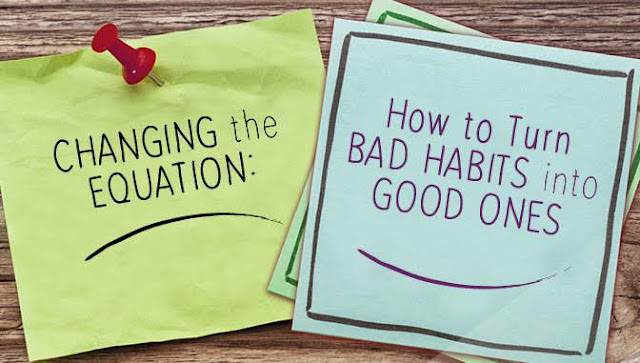Taking on two or more habits at once:
We’ve all done this. I want to learn to wake early, and to start running, and to eat healthier, and to be more organized, and to write every day … all at once! But no matter how much enthusiasm we have for all of these goals, taking on even just two habits at once is setting ourselves up for failure. I’ve tried it. Many times. It’s certainly possible, but it’s not for those of us who have difficulty changing habits. I would estimate that you triple or even quadruple your chances of success if you focus on one habit at a time, for one month at a time. Devote all of your energy to that habit change, and once it’s on autopilot, move on to the next one. Knock ’em down one at a time.
Being half-committed:
we always committ some ourselves Or make a Resolution to do something or to avoid something. But its always us who break that commitment. Or we say "only for this time and not again" but it keeps happening. we lie to ourselves. we convince ourselves for that thing. And than also feel regret about the same. So, what we can do is to whenever the same situation comes avoid it whole. Avoid that situation in which you always fall into and break your own commitment. Avoiding the whole scene will better to avoid that thing.
Not committing a plan to paper:
It’s easy to wake up, jump out of bed, and yell out loud, “I’m going to make a change today!” Who among us hasn’t done that? (Side note: if you don’t live alone, your housemates or family members might not appreciate all the yelling.) But just telling ourselves, whether out loud or quietly in our heads, that we’re going to change isn’t enough. You have to write down your goal. Write a start date. Write an end date (21 days is a good time frame). Write down exactly what you’re going to do. Write down how you’re going to be accountable, what your rewards are, what the obstacles are, what your triggers are. More on these below. Main thing: put it on paper and stick to the plan.
Habitica App:
Habitica is extremely creative in its approach to tracking and maintaining good habits. It is inspired by RPG video games, each task you complete will level up your customized avatar giving you an extra incentive to stay motivated.
Not realizing the obstacles:
Every habit change is a path littered with obstacles. Unfortunately, when we hit some of these, we often quit. Or we’ll try again, but hit the same obstacles again and again with the same result. Instead, think it through, and anticipate your obstacles. If you’ve failed before, think about what obstacle stopped you. If you’ve never done this habit change before, do some research and read about others who’ve succeeded and failed at it, and find out what obstacles you should expect. Then make a plan for what you’ll do when you face the obstacles. For example, I have a hard time eating in moderation when I go out. What will I do when I go out to eat? What are my strategies? I have to think these through before actually going out, because when the urge hits and you don’t have a plan, you’re too late.
Not thinking through your motivation:
In my experience, what people call discipline, I call motivation. Why are you disciplined enough to do something? Because you have the right motivation. When you lose the motivation, you lose the discipline. Before you start your habit change, think through your motivations. Why are you doing this? What will keep you going when you forget your reasons? Public commitment is a big motivator, of course, but you should have internal ones too. Write these down in your plan.
Not logging your progress:
You can change habits without keeping a log, but a log just increases your chances of success — and why wouldn’t you want to do that? Things are hard enough without using all the tools at your disposal. A log helps you succeed because it reminds you to be consistent. It keeps you aware of what you’re actually doing. It motivates you, because you want to write good things in that log. It helps keep you accountable before the people you’ve made a commitment to.
Changing focus too soon:
Often we’ll start a habit change, and within a week or two change our focus to something else. Well, the habit probably isn’t firmly ingrained by then, and so we’ve wasted all that time trying to form a new habit and then abandoning it before it’s on autopilot. Instead, stick to this habit for at least 21 days, and be consistent as possible.
Quitting after failure:
However, if you do miss once, or twice or three times, don’t give up. Just figure out why you missed, and plan to beat that obstacle next time. Then be as consistent as possible from then on out, until the habit is ingrained. If you quit, you’ve let the failure beat you. But if you reset your resolve, and learn from your failure, the failure then becomes a positive thing that helps you to succeed. As I’ve said before, I see failure as a stepping stone to success.
Not being consistent:
I’ve mentioned this a couple times now, but it should be addressed because it’s important. If you attach a habit to a trigger, you have to do the habit every single time, immediately following the trigger. If you do it sometimes and not others, you will not have a habit. Try not to miss a single time if possible, because once you miss once, you’ll be tempted to miss another time, and then a third, and then you’ve got nothing.
Habit-Bull App:
Habit-bull is one of the most feature-rich habit tracker apps and it’s detailed recording system means you’ll be able to get detailed information about your progress.
Download: iOS and Android









Comments
Post a Comment